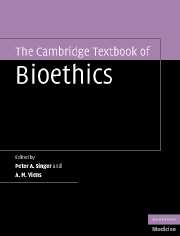Book contents
- Frontmatter
- Contents
- List of contributors
- Acknowledgements
- 1 Introduction
- Section I Information problems
- Section II End of life care
- Section III Pregnant women and children
- Section IV Genetics and biotechnology
- Section V Research ethics
- Section VI Health systems and institutions
- Section VII Using clinical ethics to make an impact in healthcare
- Section VIII Global health ethics
- Section IX Religious and cultural perspectives in bioethics
- Introduction
- 47 Aboriginal bioethics
- 48 Buddhist bioethics
- 49 Chinese bioethics
- 50 Hindu and Sikh bioethics
- 51 Islamic bioethics
- 52 Jehovah's Witness bioethics
- 53 Jewish bioethics
- 54 Protestant bioethics
- 55 Roman Catholic bioethics
- Section X Specialty bioethics
- Index
- References
51 - Islamic bioethics
Published online by Cambridge University Press: 30 October 2009
- Frontmatter
- Contents
- List of contributors
- Acknowledgements
- 1 Introduction
- Section I Information problems
- Section II End of life care
- Section III Pregnant women and children
- Section IV Genetics and biotechnology
- Section V Research ethics
- Section VI Health systems and institutions
- Section VII Using clinical ethics to make an impact in healthcare
- Section VIII Global health ethics
- Section IX Religious and cultural perspectives in bioethics
- Introduction
- 47 Aboriginal bioethics
- 48 Buddhist bioethics
- 49 Chinese bioethics
- 50 Hindu and Sikh bioethics
- 51 Islamic bioethics
- 52 Jehovah's Witness bioethics
- 53 Jewish bioethics
- 54 Protestant bioethics
- 55 Roman Catholic bioethics
- Section X Specialty bioethics
- Index
- References
Summary
An 18-year-old Muslim man sustains severe head injures in a traffic accident while riding his motorcycle. He is declared brain dead. The transplant coordinator approaches the grieving mother to obtain consent for organ donation. At first, the patient's mother is shocked at this approach. She then politely says that she would like to wait for her family to arrive before making a decision.
A 38-year-old Muslim woman is found to have a rapidly growing carcinoma of the breast. She requires surgery and postoperative chemotherapy. She is five weeks into her first pregnancy and is advised to terminate the pregnancy before the chemotherapy.
What is Islamic bioethics?
In Islam, human beings are the crown of creation and are God's vicegerents on earth. (Qur'an, 2:30) They are endowed with reason, choice, and responsibilities, including stewardship of other creatures, the environment, and their own health. Muslims are expected to be moderate and balanced in all matters (al Khayat, 1995) including health. Illness may be seen as a trial or even as a cleansing ordeal, but it is not viewed as a curse or punishment or an expression of Allah's (God's) wrath. Hence, the patient is obliged to seek treatment and to avoid being fatalistic.
Islamic bioethics is intimately linked to the broad ethical teachings of the Qur'an and the tradition of the Prophet Muhammad, and thus to the interpretation of Islamic law.
- Type
- Chapter
- Information
- The Cambridge Textbook of Bioethics , pp. 408 - 415Publisher: Cambridge University PressPrint publication year: 2008
References
- 1
- Cited by



